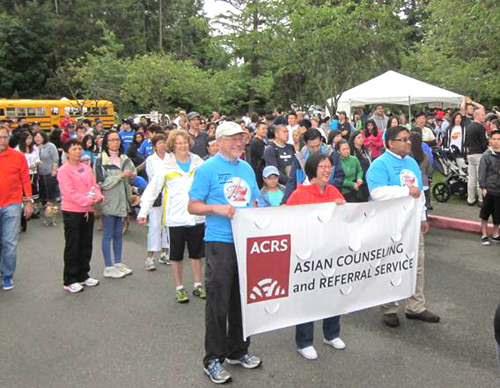By Elizabeth Wang
Northwest Asian Weekly

(left to right) Richard Conlin, Seattle City Councilmember, Diane Narasaki, ACRS executive director, and Debadutta Dash, president of the ACRS Board of Directors holding the banner at Walk for Rice (Photo provided by ACRS)
Walkers, runners, and dogs of all ages gathered at Seward Park in Seattle to support the 22nd Annual Walk for Rice campaign on June 30.
Proceeds go to the Asian Counseling and Referral Services (ACRS) Food Bank. This year, coordinators of Walk for Rice set up a 2.4-mile race hoping to bring in more than 1,000 participants to help raise money toward their donation goal of $200,000. By registering, racers agreed to collect donations from friends and families. Sponsors and general donations were also welcomed.
Jason Costales is a first time participant at Walk for Rice. He heard about the race through his aunt, who works for the ACRS.

Volunteers hold up signs to encourage runners on their way to the finish line (Photo by Elizabeth Wang/NWAW)
“It’s so close to home,” Costales said. “We rarely have events aimed toward this ethnic-specific community.”
Wanting to give back to his community, Costales donated and ran in the race to show his support. As part of the Asian community, he sees the struggles of others around him.
“More important than a name and the logistics behind having the race is the food [is] going to people who need food,” said Costales.
“You’re hungry. You can satisfy needs right away, but some people run into problems finding food. They need this kind of external force to find [food]. You don’t have to look so far.”
The ACRS Food Bank is the second most-used food bank in King County, providing more than 126,000 pounds of food a month to people in need. Sixty-five percent of their clients include children under the age of 18 and seniors over the age of 65. The money they receive is used by the food bank to buy food and provide support services.
Eric Eun, executive director of Wellspring, worked with his church and All Nations Community Church to lead his team of runners for the cause. Through events like Walk for Rice and organizations like ACRS, Eun hopes to incorporate his church and gather other churches to participate in these events.
“There are not a lot of organizations like ACRS tending to this community,” Eun said. “And for ACRS to be well-funded and well-organized, and be able to interact directly with the people and make an impact on them is amazing … something I’ve never seen.”
Eun said he noticed an Asian-specific cultural mentality of wanting to protect themselves and their own needs, where family comes first and people must fend for themselves. But Eun thinks that needs to change.
“We need to take a different approach. We need to not tend to what we have, but we have to give back from what we have.” Eun said.
Neha Nariya, a second time participant in Walk for Rice, also believes that this issue of poverty in the Asian community needs more visibility. Because the concept that Asians do not need any aid is so prevalent, problems dealing with hunger are easily overlooked.
“There are stereotypes that Asians are successful, but that doesn’t mean everyone is,” Nariya said. “Not all minorities are equal. There are needs in every community.”
Having grown up in an Asian community, Nariya said the issue of poverty in the API community tugs at her personally.
“We live in a country of abundance and it’s really easy to think that everyone is well fed,” she said. “But that’s not the case. … Sometimes, it’s embarrassing to ask for help.”
Organizations like ACRS and fundraising events like Walk for Rice sends a clear message to those who can help provide services and also to those who are in need.
“To say that it’s OK, let’s help each other out,” Costales said. “That’s what I’m here for.”(end)
Elizabeth Wang can be reached at info@nwasianweekly.com.



